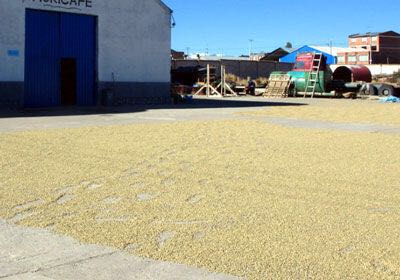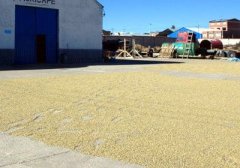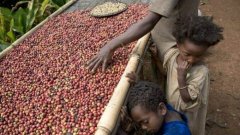Characteristics of flavor and aroma of fine coffee beans after washing iron in Lake Titicaca, Bolivia

Flavor: dry aromas of roasted nuts and almonds, supple fruit acidity of orange and white pomelo on the palate, sweet caramel on the whole, smooth texture of firm fruit milk, cleanliness and balance, and attractive herbal aromas.
Baking
Factory name: Dazhen Coffee Qianjie Cafe location: Guangzhou Baoqian Street 10 manufacturer contact Information: 38364473 ingredients Table: self-baking shelf life: 90 net content: 227g Packaging: raw and cooked coffee beans in bulk: whether coffee beans contain sugar: sugar-free origin: Bolivia roasting degree: moderate
Lake Titicaca Copacabana
Country: Bolivia
Altitude: 3812m
Producing area: Lake Titicaca
Baking degree: medium baking
Treatment: washing
Variety: iron pickup
Producer: tapping Baigabana small farmers
Flavor: dried aromas of roasted nuts and almonds, orange and pomelo
The advantage of Bolivian coffee lies in its high altitude and excellent varieties of coffee, where the traditional Tibica and a small amount of Kaddura are highly valued in the world market. In the past, coffee trees in Bolivia used to act as hedges and ornaments around the garden. Real commercial production began in the early 1950s. The coffee industry in Brazil was badly damaged by the great frost in 1957, while Bolivia (Bolivia) benefited and developed rapidly. Bolivian coffee is grown at an altitude of 180,000,670 meters above sea level, and the Arabian washed coffee beans are exported to Germany and Sweden, which are not the best in taste today and have a bitter taste.
South America is rich in coffee beans, and Bolivia is no exception. The unique tropical rain forest environment in some parts of Bolivia provides excellent natural conditions for the growth of organic coffee. The aroma of Bolivian coffee is rich and unique, both the aroma of ground beans and the aroma of coffee are obviously rich, similar to the mixture of flower and fruit aroma, impressive.
Lake Titicaca, located on the Coaya Plateau on the border between Bolivia and Peru, is the highest and largest freshwater lake in South America, one of the highest large freshwater lakes in the world, the highest navigable lake in the world, and the third largest lake in South America (after Lake Maracaibo and Patus lagoon).
Important Notice :
前街咖啡 FrontStreet Coffee has moved to new addredd:
FrontStreet Coffee Address: 315,Donghua East Road,GuangZhou
Tel:020 38364473
- Prev

Lake Titicaca, Bolivia, small farmers, water washed, iron pica, fine coffee beans, freshly roasted, freshly ground.
Name: Dazhen Coffee Front Street Cafe Address: No.10 Baoanqian Street, Guangzhou City Factory Contact: 020-38364473 Ingredients List: Self-baked Shelf Life: 90 Net Content: 227g Packaging Method: Bulk Coffee Bean Ripe Degree: Coffee Ripe Bean Sugar Free Origin: Bolivia Roasting Degree: Moderately Roasted Lake Titicaca Copacabana Country: Bolivia
- Next

Lake Titicaca in Bolivia: water washing, iron washing, Pica boutique coffee beans, origin, development, history and culture
The advantage of Bolivian coffee lies in its high altitude and excellent varieties of coffee, where the traditional Tibica and a small amount of Kaddura are highly valued in the world market. In the past, coffee trees in Bolivia used to act as hedges and ornaments around the garden. Real commercial production began in the early 1950s. The great frost in 1957 seriously damaged Pakistan.
Related
- Detailed explanation of Jadeite planting Land in Panamanian Jadeite Manor introduction to the grading system of Jadeite competitive bidding, Red bid, Green bid and Rose Summer
- Story of Coffee planting in Brenka region of Costa Rica Stonehenge Manor anaerobic heavy honey treatment of flavor mouth
- What's on the barrel of Blue Mountain Coffee beans?
- Can American coffee also pull flowers? How to use hot American style to pull out a good-looking pattern?
- Can you make a cold extract with coffee beans? What is the right proportion for cold-extracted coffee formula?
- Indonesian PWN Gold Mandrine Coffee Origin Features Flavor How to Chong? Mandolin coffee is American.
- A brief introduction to the flavor characteristics of Brazilian yellow bourbon coffee beans
- What is the effect of different water quality on the flavor of cold-extracted coffee? What kind of water is best for brewing coffee?
- Why do you think of Rose Summer whenever you mention Panamanian coffee?
- Introduction to the characteristics of authentic blue mountain coffee bean producing areas? What is the CIB Coffee Authority in Jamaica?

